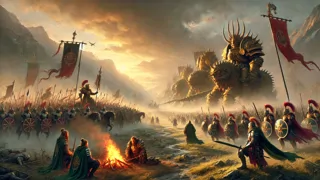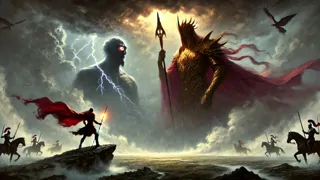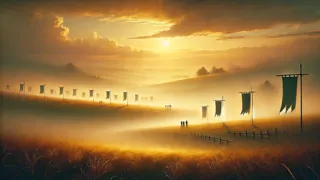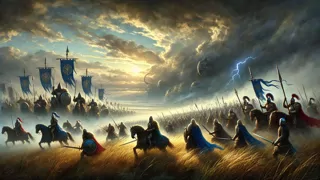Introduction
Long ago, when Ireland's rolling hills were veiled in eternal mists and the boundaries between worlds blurred beneath the shadow of ancient stones, two mighty races vied for dominion: the Tuatha Dé Danann and the Fomorians. In the age before iron, when druids whispered secret names to the living land, the Second Battle of Mag Tuired pealed across the green plains like thunder, echoing through the heart of every future legend. The Tuatha Dé Danann, the People of the Goddess Danu, came as bringers of knowledge, art, and wondrous magic, guided by a sense of destiny and bearing gifts shaped by the unseen hand of the gods. Yet their arrival unsettled the primordial Fomorians, beings born of chaos and storm, whose rule was as old as the first breaking wave against Ireland’s cliffs. By this time, spells and politics, alliances and betrayals, had drawn battle lines invisible but unmistakable, as the land herself seemed to choose a side with the sighing of winds and the stir of trees.
At Mag Tuired—a plain sacred to both fate and history—great champions gathered: Nuada of the Silver Hand, king of the Tuatha Dé; Lugh Lámhfhada, the shining prodigy whose many skills would tip the world’s balance; and the dread Balor of the Fomorians, whose gaze promised ruin to armies and whom even night dreaded. There, loyalty and treachery set the air ablaze, as the Children of Danu prepared their warriors, sharpened their spears, and summoned the arts woven into their bones. Fate gathered like a storm. It was not merely war, but the world itself at stake—the right of sunlit life over the tyranny of darkness.
By the time dawn spilled her gold across the chill grass of Mag Tuired, every blade and stone bore witness to the weight of destiny. The final clash would spill not just blood, but promise—the promise of Ireland herself, an island meant to be a cradle for dreams and the epic songs yet to be sung.
Gathering Storms: The Path to Mag Tuired
The time before the second battle was all rumblings and portents, a swelling tide of omens that neither the Tuatha Dé Danann nor the Fomorians could ignore. In the green fastness of the Sidhe, the Tuatha Dé gathered under Nuada's wise but cautious gaze. Nuada, once a king whole in body, now wore the shining silver hand the healer Dian Cecht had made for him after the wounds of the first war. He sat in counsel with his bravest—Ogma, champion and poet; Dagda, mighty in magic and feasting; the beautiful Morrígan, prophetess of blood and fate. Their camp was alive with the shimmer of sorcery and the clatter of arms, for they knew the destiny of Ireland would hinge on this coming clash.

Woven among their council was a figure perhaps more vital than any: Lugh Lámhfhada, the Long-Armed, he of a thousand skills. Raised in secrecy by foster-parents among the sea-folk, Lugh's heart beat with all the promise of a new era. His mind was nimble, his tongue a blade, his mastery of crafts, war, and knowledge unmatched. It was Lugh's arrival at Tara, with his cloak thrown wide and laughter in his eyes, that brought purpose to the weary Tuatha Dé. He would stand as champion, for he alone could match the cunning of the Fomorians in deed and strategy.
Yet the shadows lengthened as the Fomorians gathered under their iron-fisted lords. Balor of the Evil Eye, whose very look withered men, ruled with a strength that twisted the air. His daughter, Ethniu, was bright as a summer dawn, though fate’s hand had marked her as mother of Lugh—bridging enmity and prophecy. King Bres, half-Fomorian and once high king of Ireland, festering from his defeat and humiliation at the Tuatha Dé's hands, returned to his kin with a heart bent on vengeance. The Fomorians summoned not only monstrous warriors from distant isles but storm and sea-magic, seeking to drown hope itself beneath wave and shadow.
Both armies arrayed themselves on the wide, haunted plain of Mag Tuired. It was early autumn, the bracken running gold and russet, the air sharp with the scent of approaching frost. The Tuatha Dé forged shining arms from mysterious metals, while the Fomorians scoured their armories for wicked, cruel designs. The Morrígan flew above, crow-black wings whispering of doom, while druids set protective spells at the edge of campfires. Mother Danu watched silently, her spirit braided into the mists. Nothing remained now but to await the morning—when Ireland’s fate would be decided not only by blood and blade, but also by wisdom, courage, and the deep, unbroken will of the land itself.
Clash of Titans: The Battle Unleashed
The first light ignited the plain. A drumbeat of hooves and footsteps rolled out as both armies stepped forward—Tuatha Dé Danann ringed in magic and cunning, Fomorians looming with brute might. At the forefront, Ogma, the mighty of speech and sinew, raised his sword overhead, rallying the Children of Danu with words too old for forgetting. The Dagda, club in hand, called upon the elements, rousing the wind and earth to roil against the enemy. Morrígan circled above, her cries blotting the sky, a dire warning that every fate would turn today.

From the Fomorian host, Balor's presence was a storm on the earth. His warriors advanced, led by Bres—the bitter betrayer—and a dozen monstrous captains, some with the heads of goats, others with spined tails or tusks carved from old bone. They howled, and the morning quaked. With a roar of challenge, Balor strode to the front, flesh mottled, his great eye shielded beneath a thick lid sealed with seven bolts until his moment had come. He called out for the Tuatha Dé to surrender, but only Lugh stepped forward to answer, voice ringing with a defiance that pierced even the chill mist.
Steel met steel, magic clashed with magic. Spears of light javelined through the dawn, striking like thunderbolts at the Fomorians’ vanguard. Waves of enchanted arrows and darts slowed the enemy’s monstrous charge. The druids invoked shields of air, invisible but unbreakable, to deflect stones thrown by giants. Clouds of darkness, summoned by Fomorian sorcerers, crept across the field, gnawing at vision and hope alike.
Hero after hero met doom in swift and harrowing moments—battles within the battle. Nuada, calm and unbreaking, cleaved through ranks at Ogma's side. The Dagda swung his club, blasting a gap through the foe’s most disciplined regiment. Indech, another Fomorian king, countered with an onslaught of elemental fury, splitting rocks and uprooting trees. For hours, every advance was matched by a rally; every triumph shadowed by a sudden reversal.
Bres, the dispossessed king, faced his former brethren in bitter combat. He was strong, but the gods and the land remembered his cruelty; he faltered under their gaze, forced to retreat, bearing wounds that would never silver over. The Morrígan, landing among the dying, called to those who would heed her—women and men alike—reminding all that fate was written anew this day.
As the sun reached her zenith, a hush rippled down the lines. Balor strode forward, his eyelid creaking open at last. Those caught in that gaze wilted or perished where they stood. Earth curdled beneath his glance. Hope flickered. Yet from the other side broke Lugh, fleet and shining, holding his spear of deadly certainty. The prophecy drew close; everyone felt it in their marrow. The battle turned, for ill or for glory, upon the courage of a single heart and the wisdom to know when to strike.
In the gathering tumult, Lugh and Balor faced one another amid a circle of fear-knotted air. Balor laughed, and the very wind trembled. He raised the lid, eye burning gold as an autumn field in drought. But in that instant, as all time seemed to pause, Lugh cast his spear—so swift it flew as a bolt of summer lightning. It found the dreadful eye, driving it through Balor’s skull, so that his gaze fell backward upon his own kin. Fomorians in its path withered where they stood. Magic recoiled. The dawn broke anew.
With Balor’s fall, the tides shifted. The Fomorian retreat was swift and wild, like a storm undone by sunrise, while the Tuatha Dé pressed forward. Sound and fury dissolved into fleeing shadows, and the land itself sighed—the ancient magic of Ireland bound now, for another age, to those who cherished its beauty and promise.
Destiny's Aftermath: The Song of a New Ireland
As the dust settled over Mag Tuired, the land drank deep, and the cries of war faded to a trembling silence. The Tuatha Dé Danann gathered the wounded and the dead, offering prayers to Danu and crafting songs that would remember those who fell. Morrígan, her battle fury spent, wandered the fields, touching forehead and chest, weaving endings and beginnings alike with her caress. Where she passed, red blooms sprouted among emerald grass—memory and life braided together for all eternity.

Nuada, weary but unbowed, passed kingship to Lugh, the child of prophecy. The Dagda raised his voice in song, celebrating the valor and sacrifice joined on that storied field. Even the Fomorians, routed and broken, were not wholly lost. Some chose exile—drifting across the cold northern waves—while others submitted, pledging fealty to the new rulers in exchange for mercy and peace. Ireland, once contested ground, now beat with the rhythm of hope, its wounds promising renewal.
Lugh’s rule ushered in a golden age, blending wisdom with courage, justice with return. He honored both the living and the dead, decreeing that every year the festival of Samhain would recall Mag Tuired, when spirits walk and memory sharpens. Children learned the deeds of their forebears; craftsmen renewed old skills with inspired hands; poets gave voice to the land’s laughter and longing.
In the mythic echoes, the story of Mag Tuired never faded. It survived in every stone circle, every quiet glen, every star’s reflection in an Irish pool. The tale lived on in the timbre of harps and the hush of evening winds. It reminded everyone—gods, mortals, and all whose feet traced Irish earth—that sovereignty isn’t stolen or seized forever, but honored, shared, and passed down. Mag Tuired was more than a battle: it was a song of renewal, a chorus promising that out of darkness and strife, hope’s light is reborn—again and always.
Thus ends the epic tale, braided into the soul of Ireland, sung wherever courage is needed and where love of land outlasts every storm.
Conclusion
The Second Battle of Mag Tuired endures as a linchpin in Irish myth—a tale where struggle gave birth to renewal and where blood shed upon the grass became the seedbed for a nation's spirit. Its memory stirs not just in song or stone but in the stubborn hope that rises with every dawn. To this day, Mag Tuired speaks of a world where darkness can be faced and outwitted, where courage tilts a seemingly hopeless tide, and where the right to rule is won not by force alone, but by wisdom, sacrifice, and a love for land that words can barely hold. The story shapes Ireland’s soul, teaching that every generation inherits both the burdens and blessings that the Children of Danu once fought so furiously to win. In remembering their struggles and the example of heroes like Lugh, people everywhere are reminded that even in the shadow of overwhelming odds, the light of unity and purpose can forge peace from chaos. The Second Battle is not just a legend of old—it is the quiet pulse beneath every Irish field, the reason that, in both hardship and harvest, Ireland endures and thrives, never yielding its promise to shadow or despair.


















